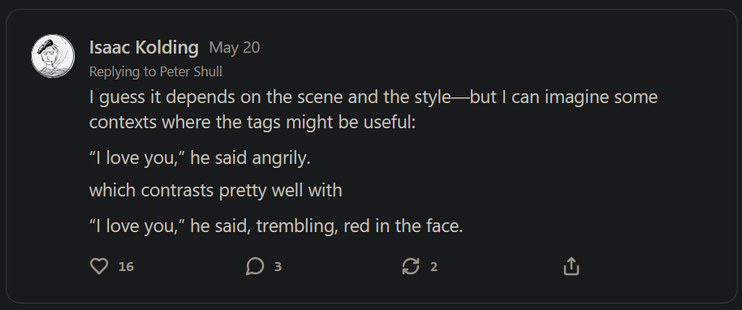From Lincoln Michel's "Counter Craft" Defending Adverbs Exuberantly if Conditionally
In Puryear’s piece, there is this passage:
There’s your pre-packaging. Just one way in which your creative freedom is stifled, a product of a systematic, state-issued conveyor belt of bourgeoise schlock, a thing worth screaming about on the internet. Unfortunately, if you believe this, then you might also believe that “Kurt said angrily” is as strong as “Kurt said, trembling, red in the face,” and that’s just too bad.
And there was a rebuttal image (attached).
I wanted to offer my own opinion because it has been weighing on me as I edit and write a set of short stories for a contest at the end of the month.
I use adverbs often. I try to "show" when I can but, as someone on the autism spectrum, I tend to go overboard when "showing" as well.
I can't help it.
What does
"I love you," he said, trembling, red in the face.
even mean? Love itself could make you tremble. You could be red in the face because you are bashful.
You'd need way more context clues to understand what it is saying. You'd really have to paint the entire scene. Maybe you are writing a novel and you can do that.
"I love you," he said angrily.
Cool. I can imagine that immediately. I know what "angrily" means to me and I will instantly apply that template to the scenario.
It makes sense. It gets the point across.
Sure, I might sometimes write a line like this.
“She's not back yet, hon,” I say, my chest tightening making it hard to swallow.
But I might also write this:
Skeletal trees shone like crystal, whistling tunelessly in the wind.
And they are both fine. Is there a verb that means "whistling tunelessly"? Probably. But you understand what I'm saying there. You see it and get it.
I think adverbs have their place. Sometimes a fancy verb can pull your audience out of the story if it doesn't' match the voice you are using to tell it.
This sentence?
Metaphysical Eschatologists from the abyssal trenches of Deep Water to the coldest, highest peaks of Kadath have endlessly debated, researched, and bloviated about The Blight since the first sapient lifeform caught a glimpse of its inevitable, insurmountable, and insatiable rush backwards through time to devour every dream, every thought, every glimmer, ever breath, and every light that ever was such that it will have never been in the first place.
It is exactly as pretentious as I want it to be, for example.

